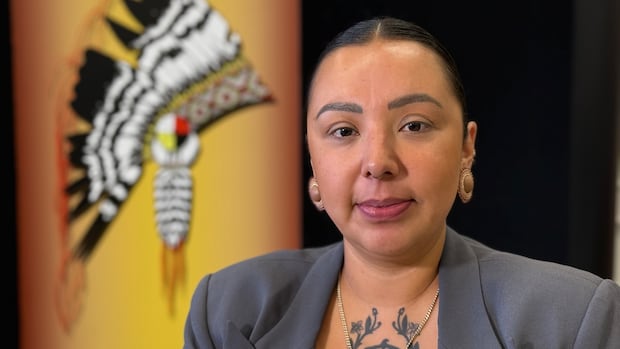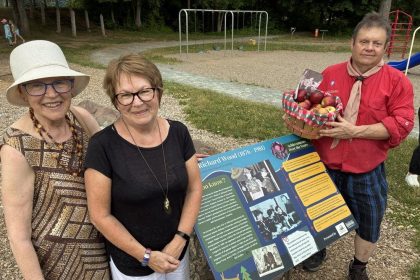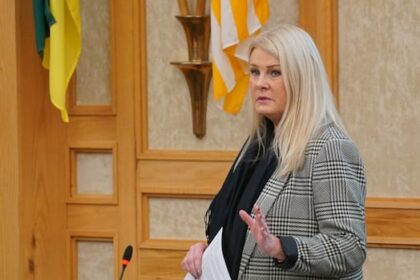ManitobaThe federal government’s new proposed spending plan falls short of addressing the needs of Indigenous people, says the Assembly of Manitoba Chiefs, which is decrying budget cuts to First Nations programming and what it says was a lack of consultation in drafting the budget in the first place. Cuts to Indigenous programs, lack of infrastructure investment among issues, says AMC Grand Chief Kyra WilsonListen to this articleEstimated 5 minutesAssembly of Manitoba Chiefs Grand Chief Kyra Wilson said she’s disappointed with the latest federal budget. ‘What we see continually every year is the government continues to make decisions … without the involvement or the participation of First Nations,’ she said Wednesday. (Jaison Empson/CBC)The federal government’s new proposed spending plan falls short of addressing the needs of Indigenous people, says the Assembly of Manitoba Chiefs, which is decrying budget cuts to First Nations programming and what it says was a lack of consultation in drafting the budget in the first place. “We are dealing with a budget … that doesn’t make a lot of sense,” Assembly of Manitoba Chiefs Grand Chief Kyra Wilson told reporters at a news conference on Wednesday.”The money that the federal government receives does come from the resources of First Nations,” but “what we see continually every year is the government continues to make decisions … without the involvement or the participation of First Nations,” said Wilson.”I understand that we are in a very difficult time right now in response to some of the tariff discussions from the U.S., but [Indigenous] leadership needs to be at these tables when decisions are being made.”The first budget under Prime Minister Mark Carney’s Liberal government, tabled Tuesday, includes proposed cuts of two per cent at both Indigenous Services Canada and Crown-Indigenous Relations and Northern Affairs Canada, translating to a total cut of almost $2.3 billion by spring 2030.While the cuts aren’t as big as had been feared, after Indigenous Services warned internally in July of reduced spending of up to 15 per cent over the next three years, Wilson said the budget “does not reflect the needs of First Nations.”Minister of Finance Francois-Philippe Champagne and Prime Minister Mark Carney make their way into the House of Commons for the tabling of the federal budget on Tuesday. (Justin Tang/The Canadian Press)”They’re talking about ‘savings,'” she said. “You can pretty the words up and make it sound great, but we’re looking at a decrease in funding for certain programs and services.” The Assembly of Manitoba Chiefs continues to review the budget, but Wilson said it’s unclear how the cuts and promised investments in some areas, like infrastructure, will directly affect Indigenous people. First Nations will likely see some benefit from promised spending at the provincial and territorial level, she said, but broad cuts to the federal government’s public service will affect Indigenous communities as well. The budget explicitly includes new funding — $2.3 billion over three years — for safe water in First Nations, as well as $10.1 million over three years for Indigenous consultations on major projects being fast-tracked through the regulatory process, but little other new money for Indigenous-specific programs.The federal government said it will review how the Indigenous Services and Crown-Indigenous Relations departments can deliver programs more efficiently. Wilson said there’s still time to amend the budget, and the Assembly of Manitoba Chiefs has input on how it can be done.”If we want to build a strong Canada, then you need to recognize and respect [the] partnerships with First Nations.”Infrastructure, housing fundingThe reduction of funding to Indigenous programs puts a strain on Brokenhead Ojibway Nation, about 100 kilometres north of Winnipeg, which is already using its own funding to subsidize federal programming, said Chief Gordon BlueSky.”That’s going to put us back,” he said. “If you start to cut programming dollars and resources … it is going to create further deficits and further hardships for our communities.”Brokenhead needs to expand its infrastructure as the community grows, but federal funding has been stagnant, BlueSky said. He also said the budget should have included support for First Nations police services and more funding for Jordan’s Principle programming. “We live in a country right now that excludes us,” he said. “It’s about time that these governments start to sit down and start figuring out how First Nations can properly participate in the economy, and not just funding agreements.”Brokenhead Ojibway Nation Chief Gordon BlueSky reduced funding in the federal budget puts a strain on his community, which is already subsidizing some federal programming. (Travis Golby/CBC)The budget includes $51 billion over 10 years for local infrastructure, such as housing, roads, wastewater facilities and health facilities. But Wilson said Canada’s focus is investing in infrastructure for provincial and territorial needs — instead of helping close the infrastructure gap in First Nations. The budget allocates $2.8 billion for urban, rural and northern Indigenous housing, and says the federal government will co-ordinate a cross-government Indigenous Housing Strategy, but few details on the latter were offered. The Southern Chiefs’ Organization, which represents 32 First Nations in Manitoba, said it appreciates the budget includes housing funding, but accused the government of repeating old promises without delivering immediate action. “Our citizens continue to live in overcrowded, unsafe and inadequate homes,” SCO Grand Chief Jerry Daniels said in a statement Wednesday. “The housing crisis in the First Nations demands urgent, shovel-ready investment.” A file picture of St. Theresa Point First Nation. The Southern Chiefs’ Organization says the budget lacks immediate action on housing on reserves, where the need is severe. (Tyson Koschik/CBC)The Southern Chiefs’ Organization said it’s also concerned about the continuation of what it called a “troubling pattern of chronic underfunding” in First Nations health care, and child and family services.SCO said it was pleased to see the budget make the national school food program permanent, with proposed annual funding of $216.6 million starting in 2029–30, but said “food security is just one part of what’s needed to improve overall health in First Nations.”ABOUT THE AUTHORSantiago Arias Orozco is a journalist with CBC Manitoba currently based in Winnipeg. He previously worked for CBC Toronto and the Toronto Star. You can reach him at santiago.arias.orozco@cbc.ca.
Thursday, 5 Feb 2026
Canada – The Illusion
Search
Have an existing account?
Sign In
© 2022 Foxiz News Network. Ruby Design Company. All Rights Reserved.
You May also Like
- More News:
- history
- Standing Bear Network
- John Gonzalez
- ᐊᔭᐦᑊ ayahp — It happened
- Creation
- Beneath the Water
- Olympic gold medal
- Jim Thorpe
- type O blood
- the bringer of life
- Raven
- Wás’agi
- NoiseCat
- 'Sugarcane'
- The rivers still sing
- ᑲᓂᐸᐏᐟ ᒪᐢᑿ
- ᐅᑳᐤ okâw — We remember
- ᐊᓂᓈᐯᐃᐧᐣ aninâpêwin — Truth
- This is what it means to be human.
- Nokoma











